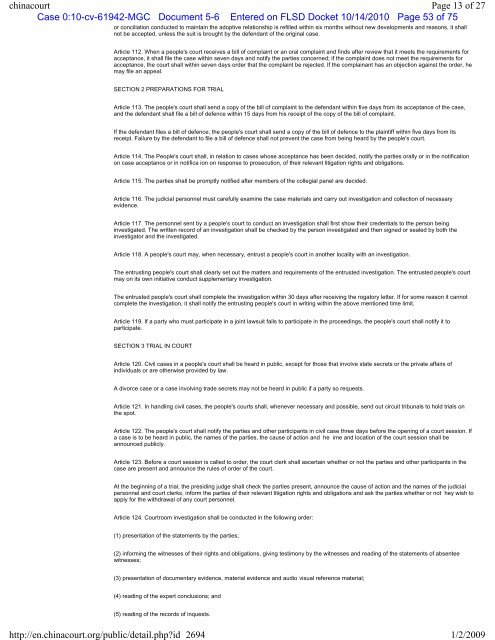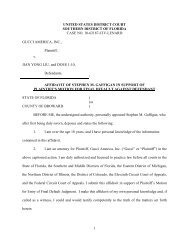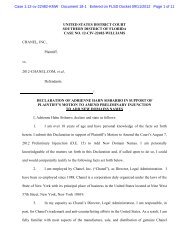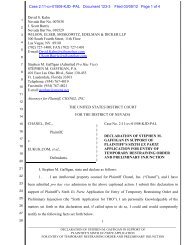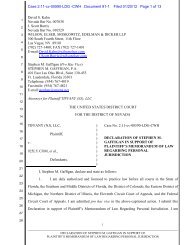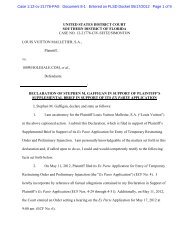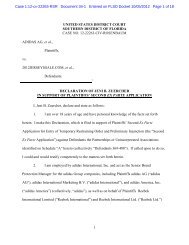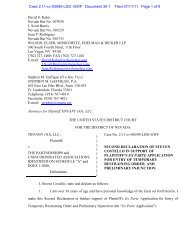- Page 1 and 2:
Case 0:10-cv-61942-MGC Document 5-2
- Page 3 and 4:
Case 0:10-cv-61942-MGC Document 5-2
- Page 5 and 6:
Case 0:10-cv-61942-MGC Document 5-2
- Page 7 and 8:
Case 0:10-cv-61942-MGC Document 5-2
- Page 9 and 10:
Case 0:10-cv-61942-MGC Document 5-2
- Page 11 and 12:
Case 0:10-cv-61942-MGC Document 5-2
- Page 13 and 14:
Case 0:10-cv-61942-MGC Document 5-2
- Page 15 and 16:
Case 0:10-cv-61942-MGC Document 5-2
- Page 17 and 18:
Case 0:10-cv-61942-MGC Document 5-2
- Page 19 and 20:
Case 0:10-cv-61942-MGC Document 5-2
- Page 21 and 22:
Case 0:10-cv-61942-MGC Document 5-2
- Page 23 and 24:
Case 0:10-cv-61942-MGC Document 5-5
- Page 25 and 26:
Case 0:10-cv-61942-MGC Document 5-5
- Page 27 and 28:
Case 0:10-cv-61942-MGC Document 5-5
- Page 29 and 30:
Case 0:10-cv-61942-MGC Document 5-5
- Page 31 and 32:
Case 0:10-cv-61942-MGC Document 5-5
- Page 33 and 34:
Case 0:10-cv-61942-MGC Document 5-5
- Page 35 and 36:
Case 0:10-cv-61942-MGC Document 5-5
- Page 37 and 38:
Case 0:10-cv-61942-MGC Document 5-5
- Page 39 and 40:
Case 0:10-cv-61942-MGC Document 5-5
- Page 41 and 42:
Case 0:10-cv-61942-MGC Document 5-5
- Page 43 and 44:
Case 0:10-cv-61942-MGC Document 5-5
- Page 45 and 46:
Tiffany Rings,Silver Rings,Tiffany
- Page 47 and 48:
Tiffany Rings,Silver Rings,Tiffany
- Page 49 and 50:
Case 0:10-cv-61942-MGC Document 5-5
- Page 51 and 52:
Google Translate Home :: Tiffany Ri
- Page 53 and 54:
Google Translate Case 0:10-cv-61942
- Page 55 and 56:
Google Translate Home :: Tiffany Ri
- Page 57 and 58:
Google Translate Case 0:10-cv-61942
- Page 59 and 60:
Google Translate SEARCH Entrez vos
- Page 61 and 62:
Google Translate Case 0:10-cv-61942
- Page 63 and 64:
Google Translate Home :: Tiffany Ri
- Page 65 and 66:
Google Translate Case 0:10-cv-61942
- Page 67 and 68:
Google Translate Home :: Tiffany Ri
- Page 69 and 70:
Google Translate Case 0:10-cv-61942
- Page 71 and 72:
Google Translate Translate from: au
- Page 73 and 74:
Google Translate Case 0:10-cv-61942
- Page 75 and 76:
Tiffany Rings,Tiffany Case 0:10-cv-
- Page 77 and 78:
Tiffany Rings,Tiffany Case 0:10-cv-
- Page 79 and 80:
Google Translate Home Featured Prod
- Page 81 and 82:
Google Translate Case 0:10-cv-61942
- Page 83 and 84:
Google Translate SEARCH CATEGORIES
- Page 85 and 86:
Google Translate Case 0:10-cv-61942
- Page 87 and 88:
Case 0:10-cv-61942-MGC Document 5-5
- Page 89 and 90:
Google Translate Case 0:10-cv-61942
- Page 91 and 92:
Google Translate SEARCH Suchbegriff
- Page 93 and 94:
Google Translate Case 0:10-cv-61942
- Page 95 and 96:
Google Translate Case 0:10-cv-61942
- Page 97 and 98:
Case 0:10-cv-61942-MGC Document 5-5
- Page 99 and 100:
Google Translate Case 0:10-cv-61942
- Page 101 and 102:
Case 0:10-cv-61942-MGC Document 5-5
- Page 103 and 104:
Case 0:10-cv-61942-MGC Document 5-5
- Page 105 and 106:
Google Translate Case 0:10-cv-61942
- Page 107 and 108:
Google Translate Case 0:10-cv-61942
- Page 109 and 110:
Google Translate SEARCH Entrez vos
- Page 111 and 112:
Google Translate Case 0:10-cv-61942
- Page 113 and 114:
Google Translate Home :: Tiffany Ri
- Page 115 and 116:
Google Translate Case 0:10-cv-61942
- Page 117 and 118:
Google Translate Case 0:10-cv-61942
- Page 119 and 120:
Google Translate Case 0:10-cv-61942
- Page 121 and 122:
Case 0:10-cv-61942-MGC Document 5-5
- Page 123 and 124:
Google Translate Case 0:10-cv-61942
- Page 125 and 126:
Case 0:10-cv-61942-MGC Document 5-5
- Page 127 and 128:
Google Translate Case 0:10-cv-61942
- Page 129 and 130:
Google Translate Case 0:10-cv-61942
- Page 131 and 132:
Google Translate Case 0:10-cv-61942
- Page 133 and 134:
Google Translate Case 0:10-cv-61942
- Page 135 and 136:
Google Translate SEARCH CURRENCIES
- Page 137 and 138:
Google Translate Case 0:10-cv-61942
- Page 139 and 140:
Google Translate SEARCH Entrez vos
- Page 141 and 142:
Google Translate Case 0:10-cv-61942
- Page 143 and 144:
Google Translate Case 0:10-cv-61942
- Page 145 and 146:
Google Translate Case 0:10-cv-61942
- Page 147 and 148:
Case 0:10-cv-61942-MGC Document 5-5
- Page 149 and 150:
Case 0:10-cv-61942-MGC Document 5-5
- Page 151 and 152:
Google Translate Case 0:10-cv-61942
- Page 153 and 154:
Google Translate Translate from: Tr
- Page 155 and 156:
Google Translate Translate from: au
- Page 157 and 158:
Google Translate Case 0:10-cv-61942
- Page 159 and 160:
Google Translate Case 0:10-cv-61942
- Page 161 and 162:
Google Translate Case 0:10-cv-61942
- Page 163 and 164:
Google Translate SEARCH Suchbegriff
- Page 165 and 166:
Google Translate Case 0:10-cv-61942
- Page 167 and 168:
Case 0:10-cv-61942-MGC Document 5-5
- Page 169 and 170:
Google Translate Case 0:10-cv-61942
- Page 171 and 172:
Google Translate Translate from: Tr
- Page 173 and 174:
Google Translate Home :: Tiffany Ri
- Page 175 and 176:
Google Translate Case 0:10-cv-61942
- Page 177 and 178:
Google Translate SEARCH CATEGORIES
- Page 179 and 180:
Google Translate Case 0:10-cv-61942
- Page 181 and 182:
Case 0:10-cv-61942-MGC Document 5-5
- Page 183 and 184:
Case 0:10-cv-61942-MGC Document 5-5
- Page 185 and 186:
Google Translate Case 0:10-cv-61942
- Page 187 and 188:
Google Translate Case 0:10-cv-61942
- Page 189 and 190:
Google Translate SEARCH Suchbegriff
- Page 191 and 192:
Google Translate Case 0:10-cv-61942
- Page 193 and 194:
Google Translate SEARCH PRODUCT TYP
- Page 195 and 196:
Google Translate CUSTOMER SERVICE A
- Page 197 and 198:
Google Translate Home :: Tiffany Ri
- Page 199 and 200:
Google Translate Case 0:10-cv-61942
- Page 201 and 202:
Google Translate You are here: Home
- Page 203 and 204:
Google Translate Case 0:10-cv-61942
- Page 205 and 206:
Case 0:10-cv-61942-MGC Document 5-5
- Page 207 and 208:
Google Translate Case 0:10-cv-61942
- Page 209 and 210:
Versand & Verfügbarkeit:Günstig T
- Page 211 and 212:
Google Translate SEARCH PRODUCT TYP
- Page 213 and 214:
Google Translate CUSTOMER SERVICE C
- Page 215 and 216:
Case 0:10-cv-61942-MGC Document 5-5
- Page 217 and 218:
2010tiffany.com - 2010 Tiffany - Ti
- Page 219 and 220:
Bijoux-tiffany.com - Bijoux Tiffany
- Page 221 and 222:
Bijouxtiffanyco.com - Bijoux Tiffan
- Page 223 and 224:
Bijouxtiffanyfrance.com - Bijoux Ti
- Page 225 and 226:
Bracelettiffany.com - Bracelet Tiff
- Page 227 and 228:
Francetiffany.com - France Tiffany
- Page 229 and 230:
Francetiffanybijoux.com - France Ti
- Page 231 and 232:
Goodtiffanyshop.com - Good Tiffany
- Page 233 and 234:
Tiffany-bijouterie.com - Tiffany Bi
- Page 235 and 236:
Tiffany-deutschland.com - Tiffany D
- Page 237 and 238:
Tiffany-schmuck.com - Tiffany Schmu
- Page 239 and 240:
Tiffanyandcoamsterdam.com - Tiffany
- Page 241 and 242:
Tiffanyandcobijoux.com - Tiffany An
- Page 243 and 244:
Tiffanyandcobijouxfrance.com - Tiff
- Page 245 and 246:
Tiffanyandcodeutschland.com - Tiffa
- Page 247 and 248:
Tiffanyandcofr.com - Tiffany And Co
- Page 249 and 250:
Tiffanyandcofrance.com - Tiffany An
- Page 251 and 252:
Tiffanyandcofrance.net - Tiffany An
- Page 253 and 254:
Tiffanyandcoparis.net - Tiffany And
- Page 255 and 256:
Tiffanyandcopascher.net - Tiffany A
- Page 257 and 258:
Tiffanybijouxfrance.com - Tiffany B
- Page 259 and 260:
Tiffanycofrance.com - Tiffany Co Fr
- Page 261 and 262:
tiffanydeutschlandde.com Whois - ti
- Page 263 and 264:
Tiffanygermany.com - Tiffany German
- Page 265 and 266:
Tiffanyoesterreich.com - Tiffany Oe
- Page 267 and 268:
Tiffanyschmuckat.com - Tiffany Schm
- Page 269 and 270:
Tiffanyschmuckdeutschland.com - Tif
- Page 271 and 272:
Tiffanyschmuckonline net - Tiffany
- Page 273 and 274:
Tiffanysfrance.com - Tiffanys Franc
- Page 275 and 276:
Tiffanysschmuck.com - Tiffanys Schm
- Page 277 and 278:
Tiffanyzuerich.com - Tiffany Zueric
- Page 279 and 280:
Tiffanydeutschland.de - Tiffany Deu
- Page 281 and 282: Li k to tiff y chmucko li e. et tif
- Page 283 and 284: SeoQuake linkinfo - external - http
- Page 285 and 286: SeoQuake linkinfo - external - http
- Page 287 and 288: SeoQuake linkinfo - external - http
- Page 289 and 290: SeoQuake linkinfo - external - http
- Page 291 and 292: SeoQuake linkinfo - external - http
- Page 293 and 294: SeoQuake linkinfo - external - http
- Page 295 and 296: SeoQuake linkinfo - external - http
- Page 297 and 298: SeoQuake linkinfo - external - http
- Page 299 and 300: SeoQuake linkinfo - external - http
- Page 301 and 302: SeoQuake linkinfo - external - http
- Page 303 and 304: SeoQuake linkinfo - external - http
- Page 305 and 306: SeoQuake linkinfo - external - http
- Page 307 and 308: Case 0:10-cv-61942-MGC Document 5-6
- Page 309 and 310: Case 0:10-cv-61942-MGC Document 5-6
- Page 311 and 312: HCCH | Full text Case 0:10-cv-61942
- Page 313 and 314: HCCH | Full text Case 0:10-cv-61942
- Page 315 and 316: HCCH | Full text Case 0:10-cv-61942
- Page 317 and 318: HCCH | Status table Case 0:10-cv-61
- Page 319 and 320: Case 0:10-cv-61942-MGC Document 5-6
- Page 321 and 322: Case 0:10-cv-61942-MGC Document 5-6
- Page 323 and 324: Case 0:10-cv-61942-MGC Document 5-6
- Page 325 and 326: Case 0:10-cv-61942-MGC Document 5-6
- Page 327 and 328: Case 0:10-cv-61942-MGC Document 5-6
- Page 329 and 330: Case 0:10-cv-61942-MGC Document 5-6
- Page 331: Case 0:10-cv-61942-MGC Document 5-6
- Page 335 and 336: Case 0:10-cv-61942-MGC Document 5-6
- Page 337 and 338: Case 0:10-cv-61942-MGC Document 5-6
- Page 339 and 340: Case 0:10-cv-61942-MGC Document 5-6
- Page 341 and 342: Case 0:10-cv-61942-MGC Document 5-6
- Page 343 and 344: Case 0:10-cv-61942-MGC Document 5-6
- Page 345 and 346: Case 0:10-cv-61942-MGC Document 5-6
- Page 347 and 348: Case 0:10-cv-61942-MGC Document 5-6
- Page 349 and 350: ICANN | Uniform Domain Name Dispute
- Page 351 and 352: ICANN | Uniform Domain Name Dispute
- Page 353 and 354: ICANN | Uniform Domain Name Dispute
- Page 355 and 356: Case 0:10-cv-61942-MGC Document 5-3
- Page 357 and 358: Case 0:10-cv-61942-MGC Document 5-3
- Page 359 and 360: Case 0:10-cv-61942-MGC Document 5-3
- Page 361 and 362: Case 0:10-cv-61942-MGC Document 5-3
- Page 363 and 364: Case 0:10-cv-61942-MGC Document 5-3
- Page 365 and 366: Case 0:10-cv-61942-MGC Document 5-3
- Page 367 and 368: Case 0:10-cv-61942-MGC Document 5-3
- Page 369 and 370: Case 0:10-cv-61942-MGC Document 5-3
- Page 371 and 372: Case 0:10-cv-61942-MGC Document 5-3
- Page 373 and 374: Case 0:10-cv-61942-MGC Document 5-3
- Page 375 and 376: Case 0:10-cv-61942-MGC Document 5-3
- Page 377 and 378: Case 0:10-cv-61942-MGC Document 5-3
- Page 379 and 380: PWORMI9W: 19. 141.7. 11 t Case 0:10
- Page 381 and 382: -- Weo 3 . di -.. yr% -,.. . . i 1
- Page 383 and 384:
Case 0:10-cv-61942-MGC Document 5-3
- Page 385 and 386:
Case 0:10-cv-61942-MGC Document 5-3
- Page 387 and 388:
Gmail - order 6652 https://mail.goo
- Page 389 and 390:
Gmail - order 6652 https://mail.goo
- Page 391 and 392:
Gmail - order 6652 https://mail.goo
- Page 393 and 394:
Gmail - order 6652 https://mail.goo
- Page 395 and 396:
Gmail - order 6652 https://mail.goo
- Page 397 and 398:
Gmail - order 6652 https://mail.goo
- Page 399 and 400:
Gmail - order 6652 https://mail.goo
- Page 401 and 402:
Gmail - order 6652 https://mail.goo
- Page 403 and 404:
Case 0:10-cv-61942-MGC Document 5-4
- Page 405 and 406:
Case 0:10-cv-61942-MGC Document 5-4
- Page 407 and 408:
Case 0:10-cv-61942-MGC Document 5-4
- Page 409 and 410:
Case 0:10-cv-61942-MGC Document 5-4
- Page 411 and 412:
Case 0:10-cv-61942-MGC Document 5-4


